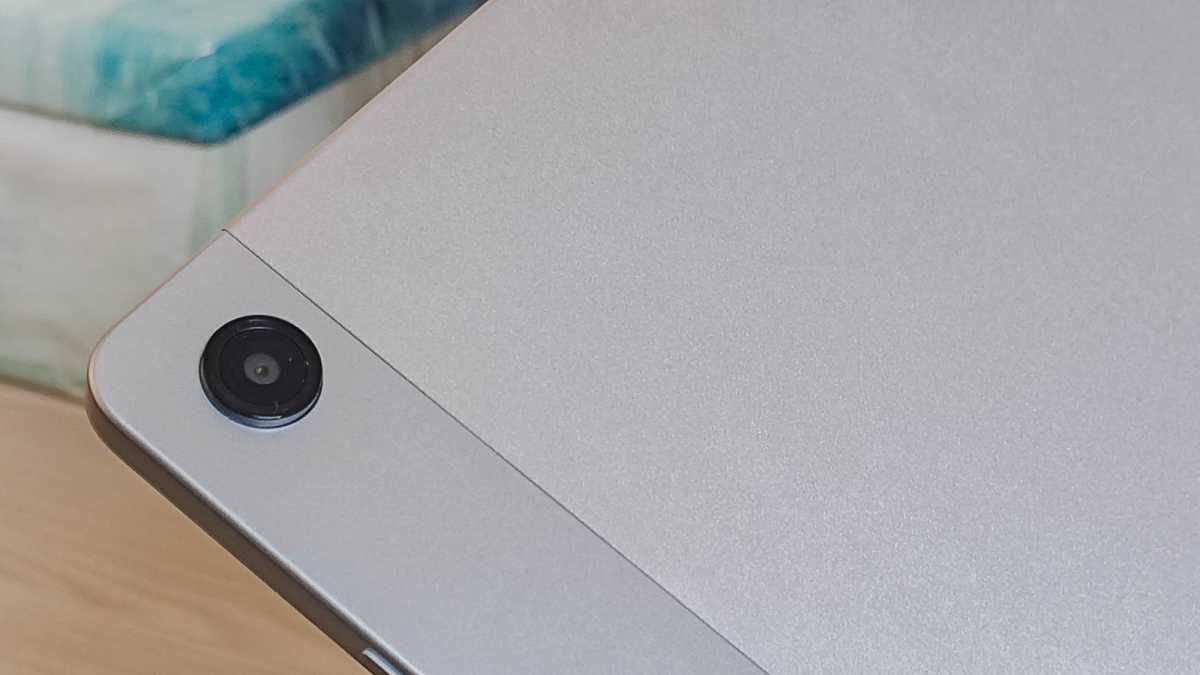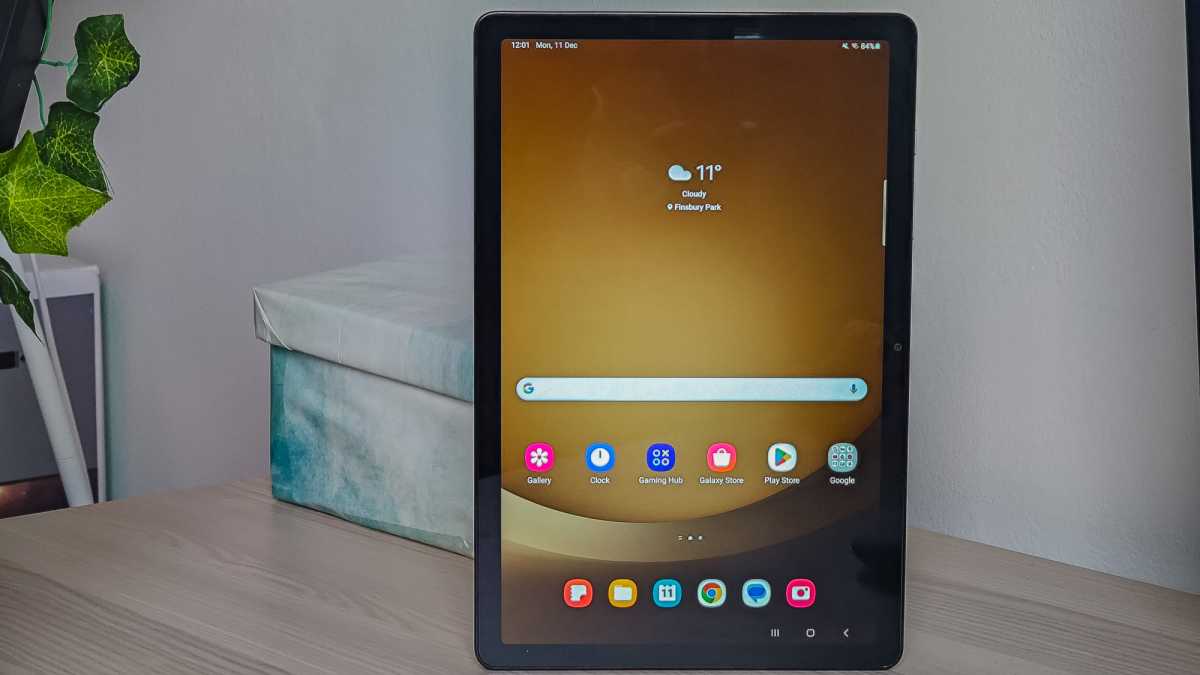Expert’s Rating
Pros
- Great performance
- Refined design
- Impressive quad speakers
- User-friendly OS
Cons
- Slow charging
- Poor cameras
- Battery life falls short of rivals
Our Verdict
The Samsung Galaxy Tab A9+ is a stellar choice if you’re after a larger Android tablet for streaming and daily tasks, but make sure you shop around as some rivals offer even more for your money.
Samsung may be best known for its flagship S series and Z foldable phones, but the tech giant also produces an excellent range of budget devices, including the Tab A series.
This year there are two budget tablet entries on offer. The Tab A9+ acts as a direct successor to last year’s Tab A8 thanks to its larger 11in screen and quad speakers, whilst the cheaper Tab A9 offers a more compact 8.7in display and a cheaper price.
There is more competition in this space than ever from the likes of Xiaomi, Oppo and Nokia, but can Samsung beat them? Here’s what I think of the Galaxy Tab A9+.
Design & Build
- Three colours
- No IP rating
- Premium and fuss-free design
Despite its sub-£250 price tag, the Samsung Galaxy Tab A9+ has a premium look and feel, with a smooth and shiny metal body. It comes in three colours: Graphite, Navy and Silver, which I tested.
It’s 6.9mm thick, so slimmer than its closest rival, the Xiaomi Redmi Pad SE. It weighs 480g, so it’s easy to carry around and hold, and can slip into a medium-sized bag for use on the go.
The back has a decorative bar along the top/left-hand side (depending on if you use it in portrait or landscape but the design is for the latter) that’s slightly reminiscent of the Oppo Pad Air, but with less flamboyance. Otherwise, the back is fuss-free, with both the logo and camera bump tucked away neatly.
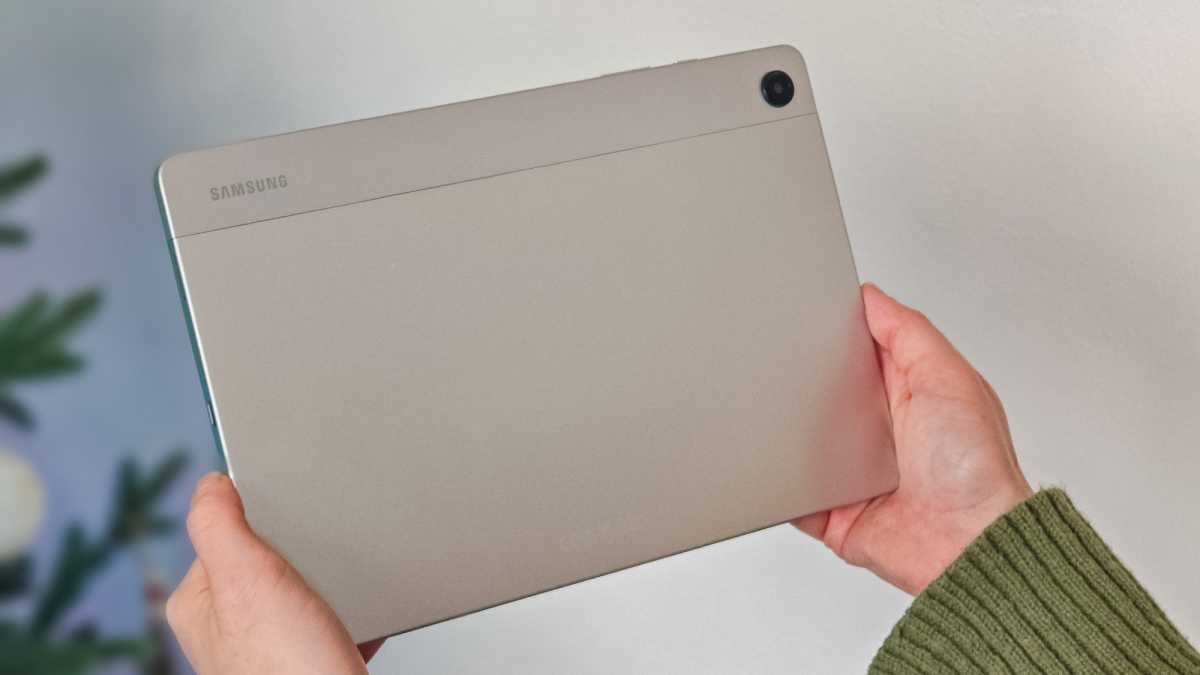
Hannah Cowton / Foundry
Whilst my tablet didn’t pick up any marks during testing, it doesn’t come with an IP rating, so it isn’t protected against water or dust. This is common on budget tablets, but the A9+ is at the upper end of the bracket, and cheaper rivals offer better durability – the Redmi Pad SE is IP52, for example.
In the box you get a USB-C to USB-C charging cable, though no adapter – this is common across most products from Samsung these days. There is also a 3.5mm headphone jack, which I was pleased to see. I tested the Wi-Fi version, but if you opt for the 5G option then you’ll get a SIM slot.
Face recognition is available for unlocking the tablet, but there isn’t the option for fingerprint unlocking – another common theme across budget tablets. Face recognition still works when wearing glasses and in dimmer conditions, which is a nice touch.
…the back is fuss-free, with both the logo and camera bump tucked away neatly
Screen & Speakers
- 11in FHD+ LCD display
- Up to 90Hz refresh rate
- Quad speakers
The Tab A9+ comes with an 11in LCD display, with a resolution of 1900 x 1200 and 206ppi, a 16:10 ratio and an 80.9% screen to body ratio. Indoors, the screen is bold and vivid, but automatic brightness often makes it appear dull. When side-by-side with the Redmi Pad SE, the latter is noticeably more impressive.
Even when the tablet is turned up to full brightness, it isn’t the easiest to view outdoors under bright sunlight, with lots of glare coming from the panel. This was also an issue with the last generation Tab 8.
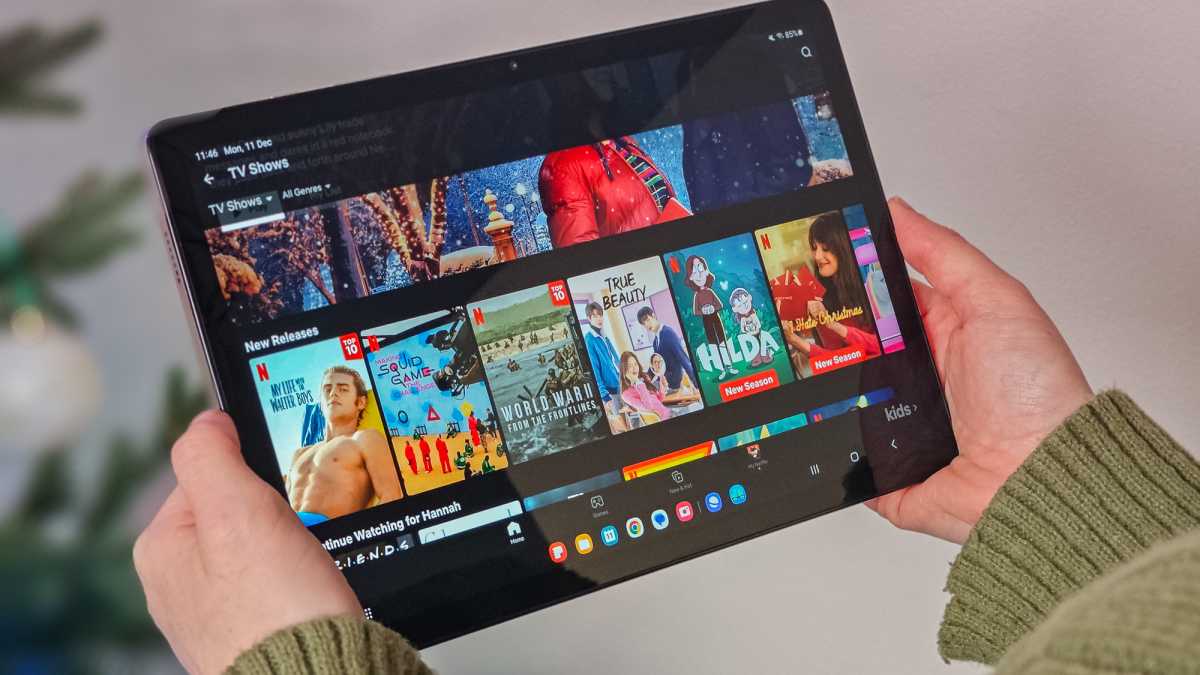
Hannah Cowton / Foundry
You can get up to 90Hz refresh rate on the Tab A9+. However, there isn’t an option to permanently turn this on – you can opt for the ‘adaptive’ mode which automatically chooses the refresh rate when scrolling or playing videos. Alternatively, you can opt for the standard 60Hz option.
The higher refresh rate gives a smooth experience when scrolling, but you won’t lose out too much if you’d prefer to conserve the battery life.
The tablet comes fitted with quad speakers. Sound is reasonably loud and has a surprising amount of depth for something without Dolby Atmos or other audio software support.
Specs & Performance
- Snapdragon 695
- Up to 8/128GB
- 5G version available
The Samsung Galaxy Tab A9+ comes fitted with a Qualcomm Snapdragon 695 chipset, paired with either 4GB RAM and 64GB worth of storage, or 8GB RAM and 128GB worth of storage.
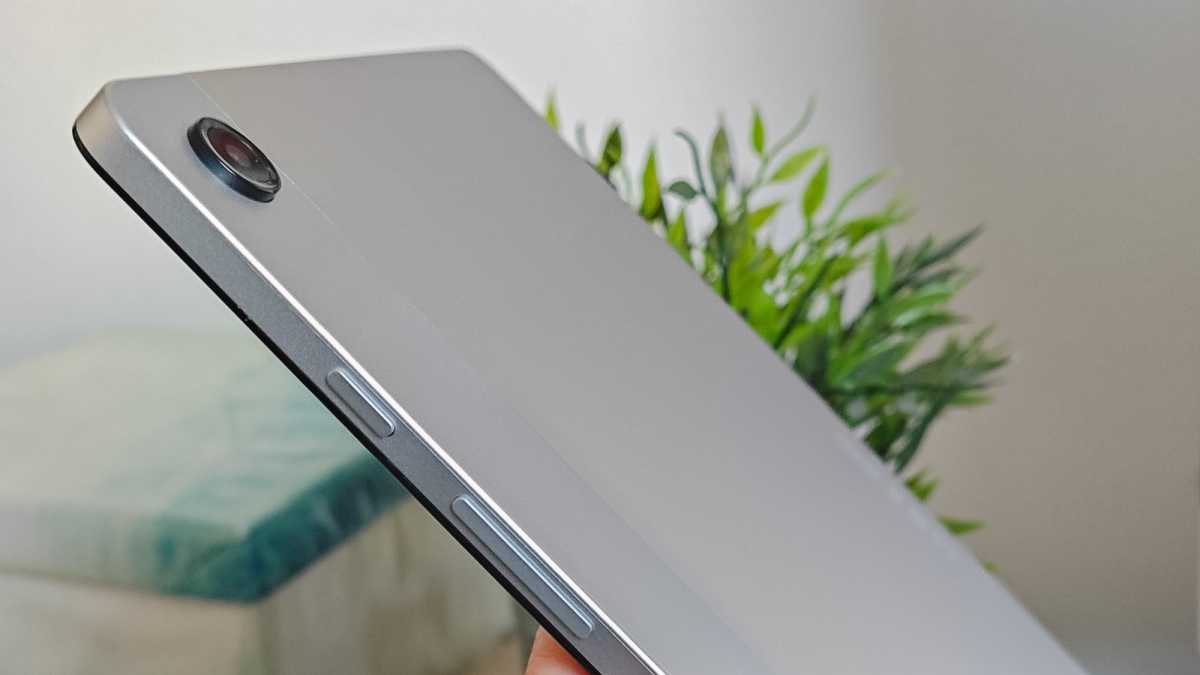
Hannah Cowton / Foundry
This octa-core processor makes performance largely smooth for day-to-day tasks. It’s quick to boot up – something many budget tablets fail to do, the vanilla Tab A9 included (which runs on a MediaTek Helio G99). Installing hefty apps did take some time, but for browsing the web, watching videos and scrolling through social media, I had no issues.
Samsung Galaxy Tab A9+ benchmarks
The base version doesn’t have much storage – there wasn’t enough room to install the performance-heavy game Genshin Impact. I’d recommend forking out the extra £50 if you plan on using this tablet quite a lot, especially with the extra RAM, but keep in mind that there is a micro-SD slot for adding up to 1TB of additional storage.
The tablet was able to play Mario Kart Tour with no lag or stuttering, but if you want to do more meatier tasks, like editing videos or playing more demanding mobile games, then I recommend looking at more premium tablet options if you can afford one.
One advantage this tablet has over the A9 is support for 5G – but that only matters if you plan on getting it on a monthly rolling plan. It’s also £50 more than the Wi-Fi version.
…for browsing the web, watching videos and scrolling through social media, I had no issues
Cameras
- 8Mp rear camera
- 5Mp front camera
Cameras are often a huge factor when testing smartphones, but we don’t put the same focus on them with budget tablets. It’s unlikely that you’ll be using them for everyday snaps as you would a phone, and not many tablets come with impressive camera hardware anyway.
That works in favour of the Samsung Galaxy Tab A9+, as the 8Mp rear camera and 5Mp front camera are pretty darn poor.
The main camera struggles to stay focused on distant details and produces quite washed-out results. It performs best in bright daylight, which made testing difficult as the tablet did not want to give me a good shot in this gloomy December weather. The same applies to snaps taken indoors or at night.
Photos that capture things closer-up – like portrait shots – are marginally better but very unlikely to be more impressive than what your phone can do. The bokeh effect is on the strong side and doesn’t have that effortless feel that more premium smartphones capture.
There is up to 10x digital zoom available, but I wouldn’t recommend going beyond 2x – the camera gets extremely shaky, and details become blown out and noisy.
You’re likely to use the 5Mp front camera more, mainly due to video calls. For this it’s sufficient (and certainly better than the 2Mp snapper that’s on the Tab A9), but don’t be expecting any crisp skin details on selfies. The camera also has a wide-angle mode, and another portrait mode.
Both cameras offer basic 1080p video recording at 30fps.
Battery Life & Charging
- 7040mAh battery
- 15W charging
- No brick in box
It’s not that the battery life on the Samsung Galaxy Tab A9+ is bad, per say. It’s just that rivals offer better.
I was able to get just over a day’s heavy usage out of the 7040mAh cell on average, including browsing social media, streaming Netflix and answering emails.
In comparison to the two-day battery life on the Xiaomi Redmi Pad SE, this hasn’t got the best longevity. This is also reflected in our benchmarking scores, with Samsung’s tablet getting eight hours and 32 minutes, and Redmi’s achieving 13 hours and 16 minutes.
It’s not that the battery life on the Samsung Galaxy Tab A9+ is bad, per say. It’s just that rivals offer better
Turning on the standard 60Hz refresh rate does make a difference. I noticed much less depletion watching YouTube and gaming, and the tablet got one hour higher in our benchmarking test. I’d recommend this mode if you’re traveling and need to conserve power.

Hannah Cowton / Foundry
The USB-C cable in the box provides up to 15W charging. With a 30W charger I had, I was able to juice it by just 16% in 30 minutes, which is slow. You’ll be looking at several hours for it to go from flat to full.
Software & Apps
- Android 13
- One UI 5.1
- Four years of security patches
If clean software is important to you, then the Galaxy Tab A9+ offers one of the best on an Android tablet. It runs on One UI 5.1, Samsung’s skin over Android 13 which is a similar experience to what you’ll find on Galaxy phones. This isn’t the latest OS available, but it should get an update to Android 14 in the near future.
Other than its own browser and productivity apps, there isn’t too much pre-installed clutter as you’ll find on Xiaomi rivals. You’ll get the Google Suite (with a few exceptions including Docs and Sheets, though these can be easily downloaded), as well as popular apps like Netflix and Spotify.
Navigation is simple and the layout is well optimised for tablets, with the dropdown settings filling the screen rather than being cramped into a corner. When you have a window open there is a shortcut bar for your most recently opened apps, and you can pin your favourites here as well.
This will disappear if you turn on full-screen mode on apps such as Netflix. On the home screen, the Edge panel (accessed by swiping from the right-hand side where the grey bar is) offers a similar experience but has various panels you can switch on such as clipboard and tools.
The Samsung Galaxy Tab A9+ will get four years of security updates, but the number of Android updates is uncertain. Based on other devices, it’s likely that it will get support for three years of OS updates rather than the four years that flagship models get.
Price & Availability
The Samsung Galaxy Tab A9+ starts from £239 for the Wi-Fi version. Here are the exact configurations you can get:
- Wi-Fi, 4/64GB – £239
- Wi-Fi, 8/128GB – £289
- 5G LTE, 4/64GB – £289
- 5G LTE, 8/128GB – £339
In the UK, you can buy it from Samsung, Amazon, Argos and John Lewis, and get it on contract from EE and Sky.
At the time of writing, the tablet isn’t on sale in the US – if that changes, we’ll update this article.
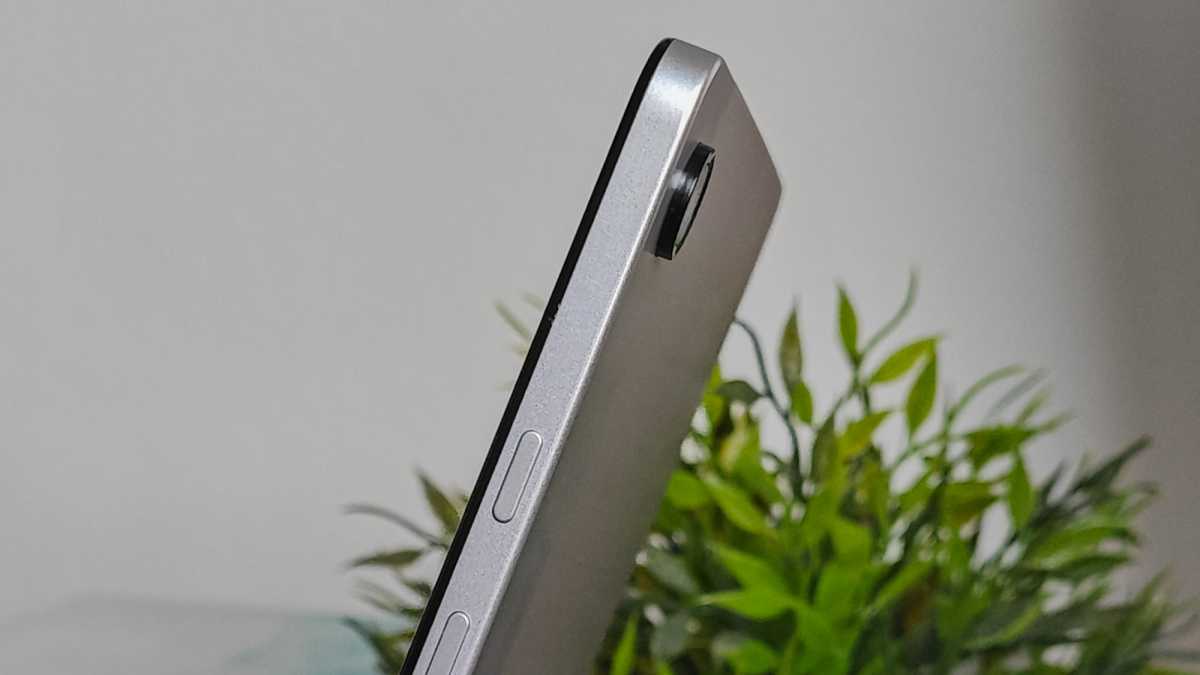
Hannah Cowton / Foundry
There’s no denying that the Galaxy Tab A9+ is excellent value for money. It offers impressive performance, a great UI and a sleek design all for a reasonable price. However, some rivals like the Xiaomi Redmi Pad SE offer even more bang for your buck.
This Tab A9+’s younger sibling, the Tab A9, is one of our top budget tablet picks and another great alternative – providing you’re happy to downsize to a smaller 60Hz screen and make do with just two speakers and a lower resolution front camera.
You can find even more options in our article on the best tablets.
Should you buy the Samsung Galaxy Tab A9+?
The Samsung Galaxy Tab A9+ offers just about everything that you could want from a budget tablet. It’s got an understated but refined design, a slick OS and great performance, making it ideal for streaming videos and surfing the web.
Perhaps a few years ago, this would’ve been our top choice for budget tablet buyers. However, the Xiaomi Redmi Pad SE offers longer battery life, a superior screen and a cheaper price. In addition, the Tab A9 is much friendlier on the old purse strings and has some similar specs to the Tab A9+, just in a smaller form factor.
However, if you want that larger 11in screen and would prefer to stick with the Samsung software and brand, then you won’t regret investing in the Tab A9+.
Specs
- Android 13, One UI 5.1
- 11in, FHD+, LCD, 90Hz
- Snapdragon 695
- 4/8GB RAM
- 64/128GB storage
- microSD card slot (up to 1TB)
- 8Mp main camera
- 5Mp front-facing camera
- Quad speakers
- Wi-Fi 802.11 a/b/g/n/ac
- 5G (optional)
- Bluetooth 5.3
- Headphone jack
- USB-C port
- 7040mAh battery
- 15W charging
- 168.7 x 257.1 x 6.9mm
- 480g
- Launch colours: Graphite, Silver, Navy
